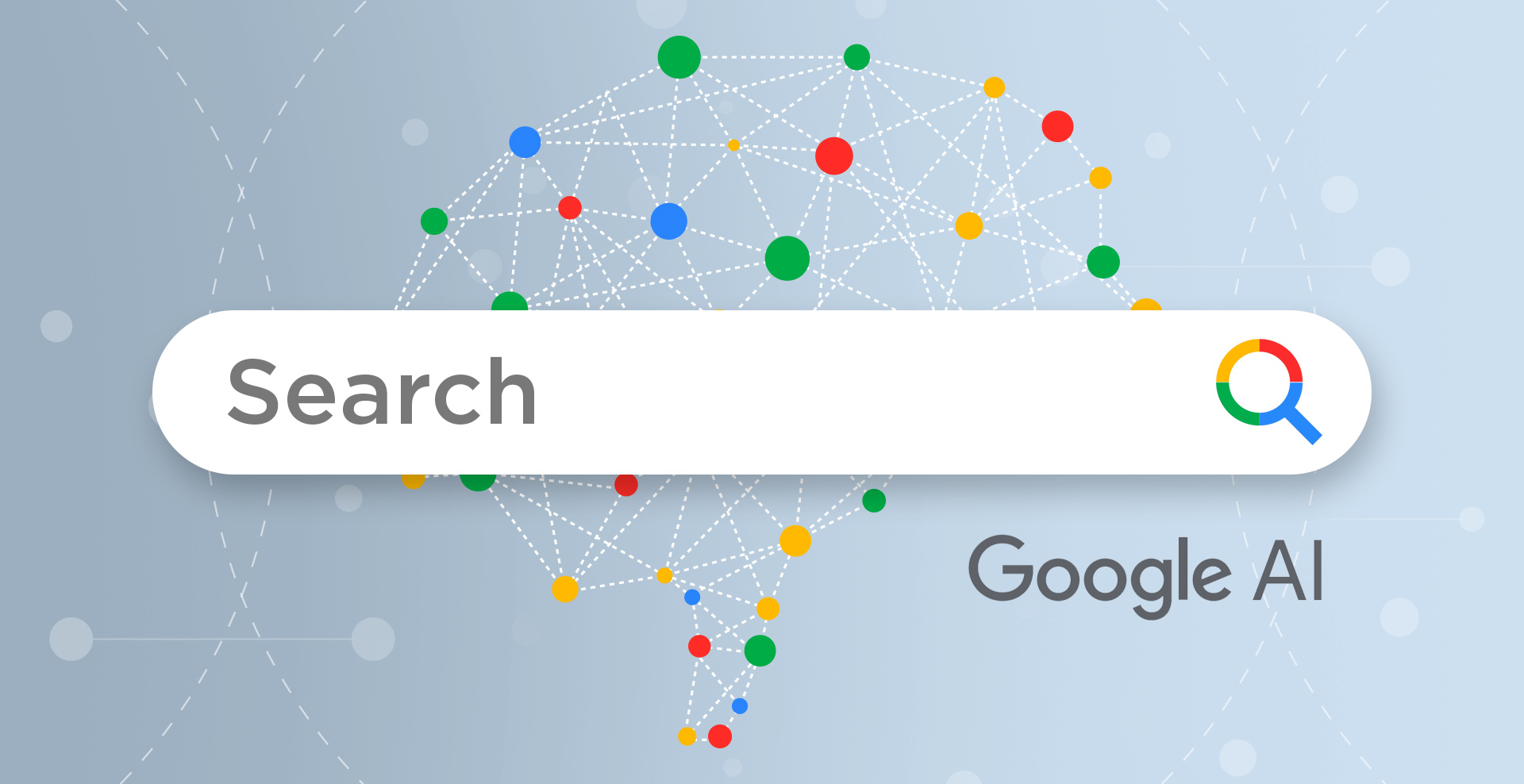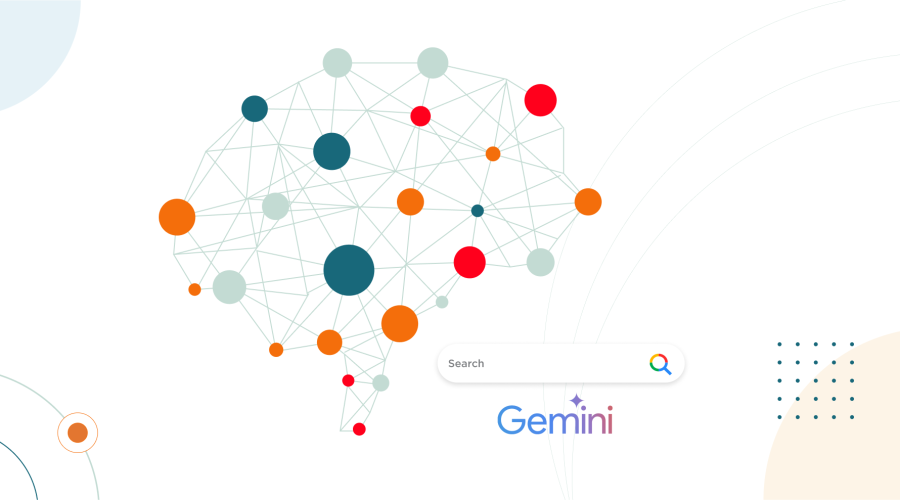Over the last year, there has been endless headlines about artificial intelligence (AI). All eyes have been on Google to see how the tech giant would embrace AI in its product portfolio. So in 2025, what do we now know?
Google finally weighed in on 14th May 2024 when they launched their very own AI-powered search results feature - Google AI Overviews (previously knowns Search Generative Experience). This new search facility was initially launched to the U.S as part of their ongoing experiments phase. In August 2024, Google announced that AI Overviews was being rolled out across six other markets including the U.K, India, Japan, Mexico, Brazil and Indonesia, along with local language support in each of these countries. Then in late October 2024 AI Overviews launched within Google Search to over 100 different countries.
But what exactly are AI Overviews? What do they mean for the future of search engines? And how will they affect your marketing efforts?
What are AI Overviews?
AI Overviews are a feature of Google’s Search Generative experience (SGE) which provides an AI generated summary of answers to a user’s search query. The new feature is powered by the Google Gemini LLM (Large Language Model), which has been designed with search at its core, and provides advanced facilities that enable multi-step reasoning, planning and multi-modality. AI Overviews aim at providing quick, clear and concise answers displayed at the top of the search results page before the traditional hyperlinks to websites.
This new AI-powered Generative Search feature is not just another regular update. It aims to change the way users interact with information online, with a more visually appealing, personalised, and people-focused search experience that’s more powerful than ever.
Where & how will the new AI Overviews appear?
When Google first announced the launch of AI Overviews, they stated that they expect the feature to be available to over a billion users by the end of 2024. Recent research from Advanced Web Ranking stated that 12.4% of analysed keywords display an AI Overview. However, since the launch in the UK, it appears the AI Overviews are now appearing much more frequently. So now, when you perform a search on Google, the first answer you see will likely be an AI-generated summary. This provides a succinct, highly relevant answer, with supporting links to websites that corroborate with the AI-generated summary.
What’s unique in Google’s application of AI is that they have developed a way for the user to dig deeper and identify the source of the AI response. This allows users to find more detailed information as they’re provided with hyperlinks through to websites that were used to formulate the AI overview. Recent analysis from seoClarity showcased that sources cited in Google AI Overviews now match one or more of the web pages displayed in the top 10 organic search results for a chosen query. This will provide some comfort for SEO and marketing professionals who might be worried that their organic traffic would likely decline following the launch of this new feature.
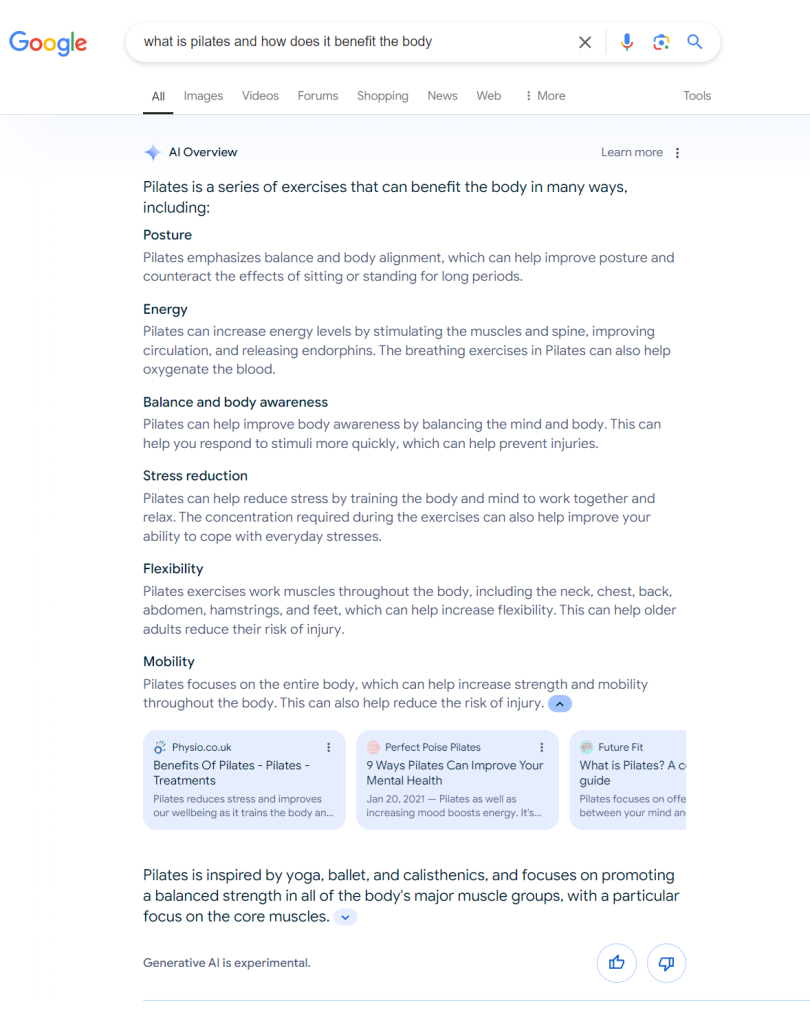
For those of you looking for some data on this new feature, you’ll be frustrated to learn that Google will not be providing any specific reports for AI Overviews within Google Search Console.
What are the features of AI Overviews?
Now that Google AI Overviews has finally launched, we are able to dive into its key features. It should be noted that Google states their “Generative AI is experimental” at the bottom of every AI powered result, so the information below is subject to change.
- AI organised search results page: Google (using AI) will change the layout of SERP based on context. This provides the most relevant information for the search query in a summarised format within the SERP, with quick links to websites where more information can be found. For example, as seen in the image below, Google has summarised the key information that answers the users search query. Google has also suggested that in the future they intend to have search results under unique, AI-generated headings which would allow the users to further brainstorm ideas based on their initial query. You can see the quick links as buttons to the right of the text in the screenshot below.
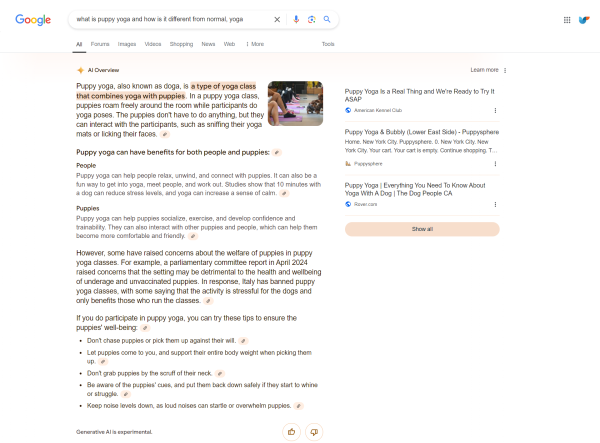
- Multi-step reasoning: Through this feature, Google enables users to ask their question and elaborate on their specific requirements to provide a tailored search result. If someone types in a query such as ‘Find the best CrossFit gym with introductory offers within a 10-minute walk of Hampstead Heath’, Google breaks down the results with studio options that fit the criteria in a carousel format. This includes relevant information such as the name of the place, rating, distance and introductory offers. The AI Overviews “reasons using the highest quality information out there”. This is a potential downside for website owners aiming to generate more organic traffic, as Google will do all the hard work and provide concise answers, meaning their users may not need to click on any of the organic web results. It should be noted that we haven’t been able to replicate this feature during our own testing, but it appears the feature will be coming to AI Overviews in the future.
Planning within the SERP: Google will be able to plan for the user within the search results. For example. you could ask Google to help you plan a trip to Scotland, and it would offer information on aspects such as the best period of the year to visit Scotland, ways to travel there and the ideal duration of the trip. It will also include suggestions on what to add to your itinerary. What’s more, AI Overviews offers quick links to websites which provide similar information that serves the search query. This feature is currently rolled out in the travel and food category only. However, Google does intend to launch this for workouts, party planning and date nights but that is still a limited user case.
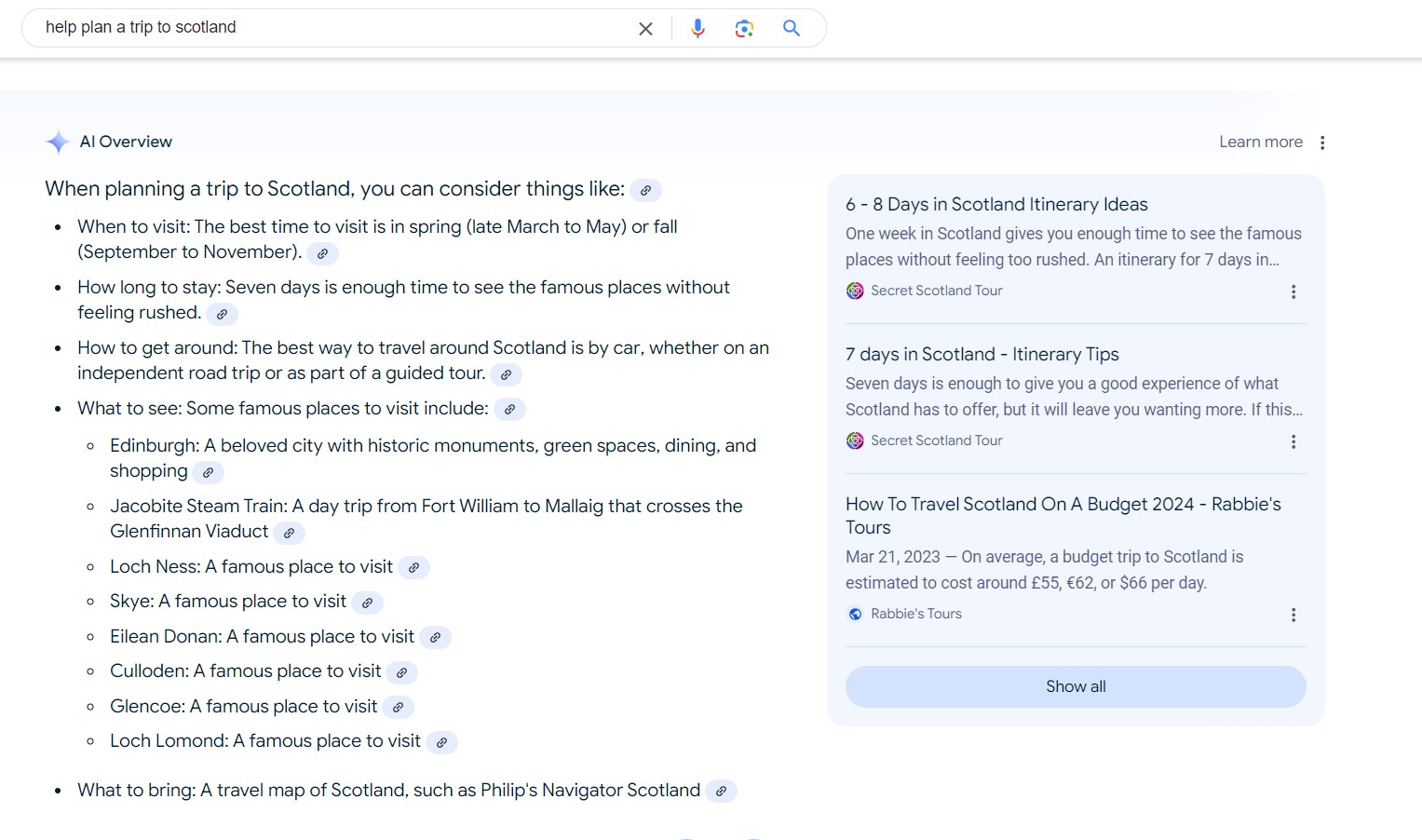
There is an additional feature within AI Overviews that will be rolled out soon which will provide multiple options to view the same search results. The user will be able to choose from viewing the search result as ‘Original’, ‘Simpler’, or ‘Break it Down’ versions of the answer to provide a simpler version of the answer or a more detailed one.
Has it been developed responsibly? Can it be trusted?
All the latest developments in AI are raising concerns around the risks of using this technology. Whether it’s Italy’s initial ban on OpenAI’s ChatGPT due to GDPR, or wider considerations around safety and bias, these concerns are leading to proposed regulation. Google’s Project Magi has been guided by its established AI principles that lay the foundations for developing AI technology responsibly:
- Be socially beneficial
- Avoid creating or reinforcing unfair bias
- Be built and tested for safety
- Be accountable to people
- Incorporate privacy design principles
- Uphold high standards of scientific excellence
- Be made available for uses that accord with these principles
These principles recognise the risks around AI bias and its threat to privacy. Of course, only time will tell how this plays out in practice given Google’s previous controversies with ethical AI.
How can I optimise my website to work with Google’s AI Overviews?
There are some important things you should do to optimise your website to work with AI Overviews, particularly with regards to how Google will now evaluate and rank content:
- Introduce structured data (schema) on your website. If you haven’t already implemented structured data on your site, now is the time to do it. Structured data – building in code to web pages to help search engines characterise and categorise their content - essentially allows Google to read content on your website more easily. This allows them to provide users with more detailed and engaging search results. Structured data is now even more important to achieve high rankings on the search results page, especially if you have an e-commerce website that relies on Google understanding the context of the products you want to show users.
- Continued focus on keywords and matching your content with the average intent of the user performing the search. With Google’s AI technology, it’s important to focus on simple information that provides high readability and provides the information the user is looking for very quickly on the page. You need to focus your attention on producing quality content that is comprehensive and addresses the user’s direct goals.
- Consider entity-based optimisation. More importantly, Some keywords lack context – making it hard for Google to make a connection. For instance, ‘Saga’ could be the over-50’s travel operator or the description of a tale involving multiple mishaps. Cue entity-based SEO. An entity means it can be uniquely defined and uses broader clues to understand the Search query. In the context of AI Overviews, this essentially means it can read and better understand relationships between entities. Tools such as Inlinks can help you internally link and mark up your content with Entity based schema and internal links.
- Create content focused on conversation. With Google now focussing its search on a more conversational flow, it’s more likely that users will search in the form of a question such as, ‘What should I wear for a hiking trip in Scotland in September?’ Content on your site should focus on answering common user questions and align with the conversational tone. Adding an expert’s perspective on topics will also feed Google’s desire for experience as well as expertise. Think of adding in an expert opinion on your products and their value, rather than just describing them.
- UX will always matter. With all these new advancements in AI, it remains true that a good user experience should always be the focus. To retain top ranking in the search pages, the experience on your site needs to be quick, easy and intuitive for users.
- Speed matters. A slow-moving website equals a high bounce rate for users. In addition, with Google’s AI implementation, slower sites won’t make the cut in the top-ranking search results. Many of the reasons for slow websites, including non-optimised code and assets, as well as poor server configuration that use more energy and result in greater carbon emissions, are at odds with Google’s focus on sustainability. It’s always been important to make sure your site is fast but is even more so now, with good website responsiveness now being a critical measure for good user experience.
- Collect high-authority links. Authority links are still critical for SEO which means that they are also critical for improving your likelihood of getting your content in Google’s AI search. Google uses a variety of factors to determine what content to show in its results, including the authority of the websites that link to it. So, if you want your content to be seen by more people, it's important to get links from high-authority websites. In other words, websites with a strong, trustworthy reputation, built over time, with a large volume of quality links pointing to them. Here are some tips for getting high-authority links and increasing your chances of being seen:
- Create high-quality content that people will want to link to.
- Promote your content on social media and other online channels.
- Reach out to other websites and bloggers in your niche and ask them to link to your content.
Conclusion - brilliant user experience is still the priority
We’ve outlined some things to do when optimising your site for Google’s AI Overviews. You can watch our on-demand webinar with our Head of Digital Optimisation, Harry Clark, for our latest learnings on how to ensure your site is Search fit.
It's clear that AI Search is about helping people get the answers they need and carry out the actions they want to, easier and faster. That means creating great websites designed for sustainability and speed that include well-structured, quality content delivered through excellent UX. That’s where you can create value and ensure your site performs well now and in the future, regardless of what Search does next. There are no shortcuts to that but it will reap huge rewards.
If you want to know more about search and best practice, take a look at our Generative AI and UX design for take and how we think we can help you optimise your website. Alternatively, please do get in touch and we can go through your ideas.
